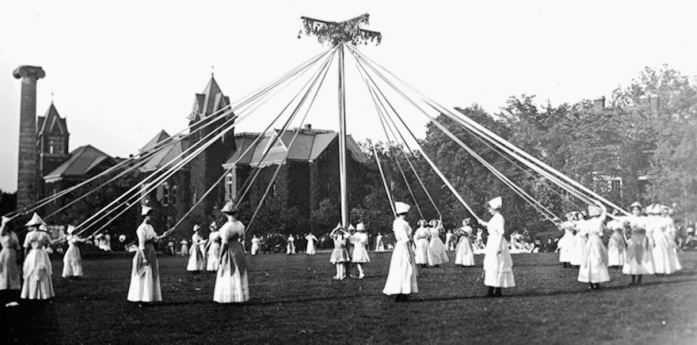
"Today is May Day; a time of the year when warmer weather begins and flowers, meadows, hedgerows and trees start to blossom. It is said to be a time of romance when peoples of all nations celebrate the coming of their summer with many different customs which express their joy after a long winter.
Traditions are numerous and have varied greatly since the first recorded Maypole was erected in the Strand in London in 1661. It was said to stand 143 feet high and remained there until it was felled in 1717, when it was used by Sir Isaac Newton to support Huygen's new telescope. This was a refracting aerial telescope with a long focus which did not use a tube. Instead, the telescope was mounted on a pole or tower and operated on a swivel ball-joint. The observer stood on the ground and held the eyepiece, which was connected to the pole by a string or connecting rod. By holding the string/connecting rod tight and maneuvering the eyepiece, the observer could aim the telescope at objects in the sky.
Today, May Day has become just one more bank holiday whereby we take the opportunity to celebrate with family and friends, march in protest or drink too much! But it wasn't always so. It was once the custom to go 'A-Maying' early morning on the 1st May.
Robert Herrick, a 17th century poet wrote those verses:
'Gather ye rosebuds while ye may,
Old Time is still a-flying;
And this same flower that smiles today,
Tomorrow will be dying.'
May Day of old began very early in the morning at the crack of dawn. People would go out before sunrise in order to gather flowers and greenery to decorate their houses and villages in the belief that the vegetation spirits would bring them good fortune. While boys continued to wash in troughs and basins of cold water, girls would wash naked in the dew of the early morning in the belief that they would be made beautiful and pleasing to the male eye. They would then don themselves in garlands of flowers picked from the morning meadows before dancing on the village green. The remainder of the day would be given over to various festivities, such as dancing, archery contests and all manner of other contests and feats of strength. All this activity occured before the crowning of the May Day Queen. The May Queen took no part in the games or dancing, but instead after being selected and crowned she prepared for her procession. She would then be 'lifted' high by a gang of young men in a flower bedecked chair and was carried through the village to the cheers of the crowd.
While I reconise the many advancements that have been made since I was born 71 years ago; when it comes to progress I feel that history shows us in a much more uncivilised light today than it did our forefathers. Instead of dancing around a Maypole in jolly spirits and good heart as was once tradition, many of today's young have moved their dancing from village green to the city streets where they bare their bums and mid-drifts for all to see as they waddle like ducks to the next watering hole.
Then as the night progresses into early morning hours, neighbourhood slumber is sharply broken by the sirens of racing police cars and the screaching of ambulances as youths fight in lumps, pull their trousers down in public or puke up in shop doorways. Their 'good night out' will usually end for the luckier ones in either 'sleeping it off' or 'having it off' in some shop doorway. For those less fortunate night riders, they'll either fill the local police station cells until their parents bail them out the following morning or start clogging up the local A&E departments and hospital space. And while the drunks block vital hospital beds, pensioners with alzheimer's who (unlike the young boozers didn't start out to lose their mind that day), roam the streets in their night garments as people with heart attacks and paralysing strokes lay on house floors waiting and waiting and waiting for the arrival of overworked ambulance staff to arrive. Progress?
As Shakespeare might have penned: 'May Day or Mayhem, that is the question?'" William Forde: May 1st, 2014
